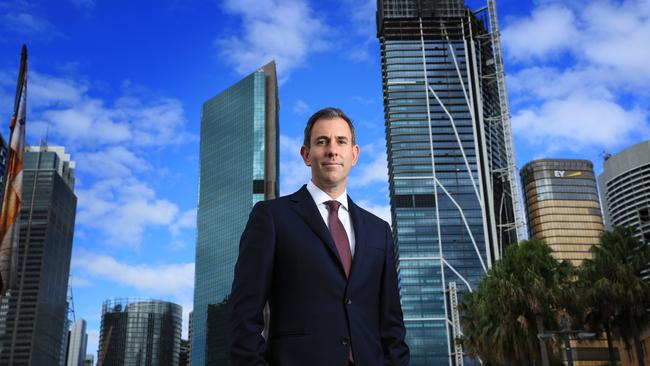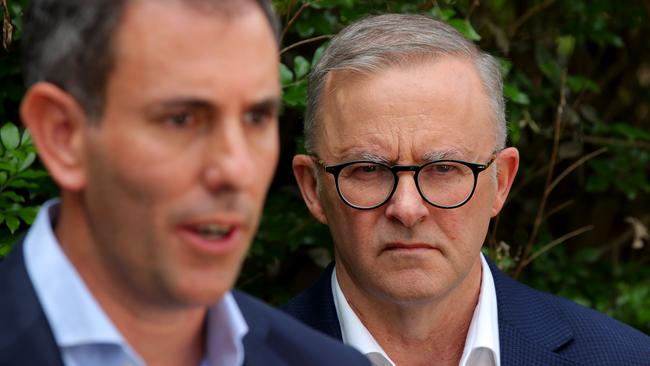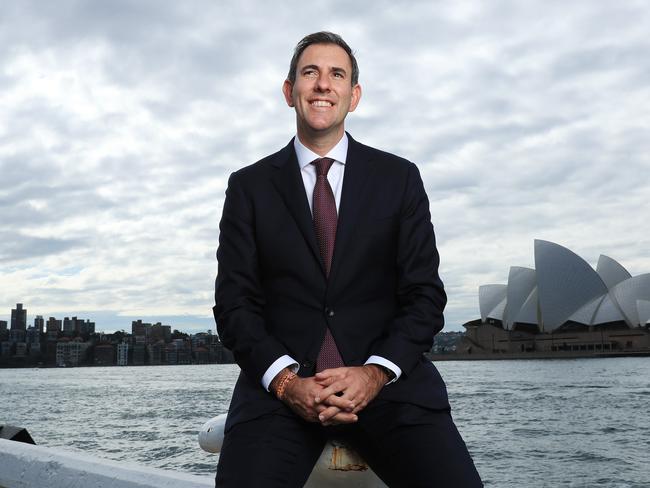Jim Chalmers says six days has shifted debate in Labor’s favour
Jim Chalmers reveals his personal mission to ‘bury’ the Coalition’s economic claims.

“We take the big challenges in the economy seriously and I don’t think the Liberals and Nationals are,” Chalmers, Labor’s Treasury spokesman, tells Inquirer in an exclusive interview. “We would be inheriting the trickiest set of economic conditions that an incoming government has inherited, probably, since the war.
“We’ve got rising interest rates, high and rising inflation, falling real wages, $1 trillion in debt, flatlining productivity and weak business investment. So, we take those challenges very seriously and we have an economic plan which is carefully designed and calibrated to deal with those challenges.”
The headline figures showing strong growth and low unemployment suggest an economy that is booming after the pandemic’s restrictions, yet there are cost-of-living pressures as evidenced by the 5.1 per cent annual inflation rate and the Reserve Bank lifting the official cash rate this week, leading to higher mortgage interest rates.
“Some of those headline indications mask a far trickier situation,” Chalmers says. “Even with unemployment coming down in welcome ways, we’ve got skill shortages running rampant in the economy, we’ve got real wages falling, we’ve got inflation out of control. So, there are serious issues in the economy which have been laid bare.
“The six days between the inflation number coming out, the release of our economic plan, the interest rate rise and the news that consumer confidence had fallen 6 per cent in one survey were the six days that shifted the economic debate decisively in our favour … these six days were a hammer blow to the Coalition’s economic credibility.”
Labor, Anthony Albanese conceded to me recently, has found it more difficult to convince voters to trust it to manage the economic levers and the nation’s finances. Chalmers wants to take this task head-on, not avoid it, and he insists the economic debate now favours Labor because the “cost-of-living crisis” is the central campaign issue.
“My mission is to bury that once and for all,” he says. “This government has taxed more, borrowed more and spent more than the last Labor government but delivered much less … real wages falling is the defining characteristic of an economy that is not delivering for middle Australia.”
But hang on. The Coalition was faced with the most perilous set of economic circumstances caused by the pandemic since the 1930s Depression. It spent a lot of money, sending debt and deficit into the red for a decade or more, but the economy is now larger and with more people employed than there were pre-pandemic. Chalmers does not buy it.
“Any objective observer of the government’s management of the pandemic would conclude that there were some good ideas badly implemented,” he claims. “Stuff-ups with vaccines and rapid tests, and in other areas, cost the economy dearly. The economy would be stronger and the recovery would be stronger were it not for the mistakes that were made.”

During the next two weeks, Chalmers and Albanese will need to persuade voters that they have the answers to the cost-of-living pressures Australians are facing and that are expected to get worse.
Labor has supported the temporary relief measures in the budget and promises further relief across time. It says it will further reduce the cost of childcare, medicines and power bills. It will address capacity constraints by investing in skills and encouraging workforce participation. These policies also will help lift wages across time, along with plans to grow advanced manufacturing, the care sector and the digital economy.
“We are realistic and responsible and measured about our claims about wages,” Chalmers says. “It is a problem that has been developing for some time and it will take some time to turn around. The difference between us and the government is that we care about it and we’ve got policies to get real wages growing again.”
With the Reserve Bank increasing the cash rate to 0.35 per cent, homeowners are going to have to spend more to meet home mortgage payments. The cash rate also increased during the Hawke, Keating, Howard, Rudd and Gillard governments. But no government welcomes rising interest rates, especially during an election campaign.
Scott Morrison’s claim that only the Coalition can be trusted to keep downward pressure on interest rates is ridiculed by Chalmers. “Morrison began this ridiculous scare campaign about petrol prices and interest rates, and that scare campaign has blown up in his face,” he says. “It was torpedoed by the rate rise and that is why his economic credibility has been shredded.”
Labor will not wait long to begin implementing its economic agenda if elected to government on May 21. Chalmers reveals for the first time that Labor would expect to present a new 2022-23 budget in October this year. Josh Frydenberg’s budget, delivered last month, would be recast.
“It would make no sense to wait until May of next year if we were successful (at the election) to hand down the government’s first budget,” Chalmers says. “My preference would be for a budget in the second half of October, subject to the advice of Treasury and consultation with my colleagues.
“That first budget will be about implementing our commitments, recognising that the defining challenges in the economy are skyrocketing inflation, falling real wages and not having enough to show for all that debt.”
As Labor plans for the 47th parliament to meet in June, the new treasurer also would present an update on the state of the budget and the outlook for the economy, and the government’s response.
“It would be appropriate for a new treasurer to outline his thinking to the parliament in or near that first sitting of the parliament via some kind of ministerial statement,” Chalmers says. “My intention would be to keep the parliament abreast of the substantially tricky economic conditions that we would inherit if we won office.”
The Opposition is concerned that the budget position may be worse than the government has estimated. Chalmers notes that wage forecasts have not been met in previous budgets while assumptions on productivity growth also have not been realised.
“One of the hidden lies at the core of the budget is that the government has heroic assumptions about productivity,” he says. “They assume that productivity growth will just miraculously reappear without actually having a plan to invest in the drivers of productivity and economic growth.”

While Chalmers and Katy Gallagher, Labor’s finance spokeswoman, plan to run a ruler over expenditure with an audit of budget measures, longer-term balance sheet repair will take a back seat. Spending is estimated to be at the high level of 27.2 per cent of gross domestic product in the next financial year and Labor does not promise to spend less.
Labor insists it is the quality of expenditure that matters, not the quantity. It rejects claims of secret tax increases across the board, saying it is proposing only one taxation reform at this election and that is on multinational tax avoidance to make sure these companies pay their fair share of tax. These measures will raise $1.89 billion across the forward estimates.
Chalmers, 44, worked as a university tutor, party research manager and adviser in government and opposition, including chief of staff to Wayne Swan (2010-13), before being elected to parliament in the outer-Brisbane seat of Rankin in 2013. He has two bachelor’s degrees and a PhD in politics. He joined the shadow ministry in his first term and was appointed Treasury spokesman three years ago.
Like former treasurers Swan and Peter Costello, he has never held a ministerial portfolio. But he won a critical endorsement this week from none other than the incumbent Treasurer. “I respect him and he does bring a great deal of experience to the role, and off camera we actually get on better than probably we do on camera,” Frydenberg said at their National Press Club debate.
As a federation under strain these past two years, there is also an opportunity to work more closely with state treasury counterparts, Chalmers believes.
“There is a tremendous crop of state treasurers,” he says. “A terrific combination of experience and new blood, and I would be part of an element of generational change when it comes to treasurers.”
While cost-of-living would be the priority challenge for a Labor government, Chalmers has his sights set longer term. The decarbonisation of the economy to address climate change and support the transition to a cleaner, greener, more reliable energy future will be, he says, Labor’s transformative economic reform.
Labor has outlined a revised safeguard mechanism that aligns with business plans to achieve net-zero carbon emissions by 2050 along with complementary policies such upgrading the electricity grid, funds to support renewable energy projects, tax cuts for electric vehicles, and investing in solar banks and community batteries.
“Cleaner and cheaper energy is our floating the dollar or our superannuation moment,” he says. “This policy, of all of our policies, gives us the best chance of unlocking tens of billions of dollars of investment, hundreds of thousands of jobs, (and) get energy costs down for households but also for businesses.
“Everybody but the government now seems to realise the vast economic opportunities of cleaner and cheaper energy and, if we are given the chance to govern the country, I think that when people look back on our period in government that will be seen as the equivalent of the major economic reforms which have delivered so much long-term prosperity.”




Jim Chalmers not only wants to persuade voters that Labor can be trusted to manage the economy and the budget at a time of profound challenges but he has a personal mission to bury the Coalition’s claim to be the superior party on economic policy.